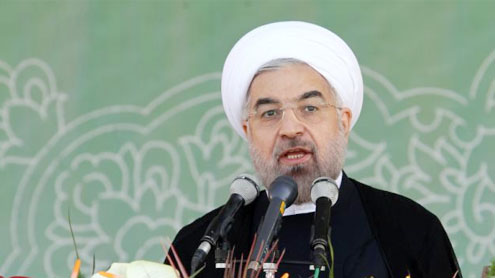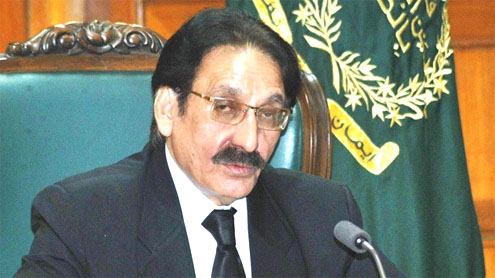
A White House official said Tuesday that while it would welcome ‘an encounter’ between President Barack Obama and Iranian President Hassan Rouhani in New York, Iranian officials have turned them down.
Obama told the United Nations General Assembly on Tuesday that the United States is primarily focusing its diplomatic efforts on Iran’s nuclear program and the Israel-Palestinian conflict.The U.S., he said, will support Iran’s use of nuclear energy, and will attempt to negotiate directly with Rouhani.’Americans see an Iranian government that has declared the United States an enemy,’ he said, ‘and directly – or through proxies – taken Americans hostage, killed U.S. troops and civilians, and threatened our ally Israel with destruction.’
‘I don’t believe this difficult history can be overcome overnight – the suspicion runs too deep. But I do believe that if we can resolve the issue of Iran’s nuclear program, that can serve as a major step down a long road towards a different relationship – one based on mutual interests and mutual respect.That phrase – mutual respect – is one that Iran has used lately to demonstrate its eagerness for acceptance in the West.’The Iranians have an internal dynamic that they have to manage and the relationship with the United States is clearly quite different than the relationship that Iran has with other Western nations,” a senior administration official told Politico.
Obama said he had instructed Secretary of State John Kerry to talk directly with Iran.He also demanded a UN Security Council resolution on Tuesday that would hold Syrian President Bashar al-Assad responsible for an August 21 chemical weapons attack that killed more than 1,400, saying ‘the evidence is overwhelming’ that the Syrian dictator was behind the action.’It’s an insult to human reason … to suggest that anyone other than the regime carried out this attack,’ Obama said.And in a defense of the United States, Obama claimed American exceptionalism is alive and well.’Some may disagree, but I believe America is exceptional,’ he told the General Assembly, standing up ‘for the interests of all.’
In a New York Times op-ed earlier this month, Russian President Vladimir Putin wrote that it is ‘extremely dangerous to encourage people to see themselves as exceptional, whatever the motivation.’Noting that Assad has ‘given an accounting’ of its chemical weapons stockpiles and promised to have them dismantled, Obama told diplomats that ‘there must be a strong Security Council resolution to verify that the Assad regime is keeping its commitments.’
‘There must be consequences if they fail to do so,’ the president added. ‘If we cannot agree even on this, then it will show that the United Nations is incapable of enforcing the most basic of international laws.”Our response has not matched the scale of the challenge’ in Syria, Obama said, where ‘peaceful protests against an authoritarian regime were met with oppression and slaughter.’While Obama demanded a Security Council resolution that provides a penalty if Syria renegs on its commitment, he reiterated that his preference ‘has always been a diplomatic resolution to this issue’And, he said, he has no desire to determine who leads Syria, whether it’s Assad or a replacement.
‘That’s for the Syrian people to decide,’ he said, noting that U.S.-led regime change in other parts of the world have been fraught with unintended consequences.’The United States has a hard-earned humility when it comes to our ability to determine events inside other people’s countries,’ Obama conceded.But, he insisted, the U.S. must remain engaged in Syria for its own national security reasons.The White House said after Obama’s speech that the United States will provide $339 million in new Syrian humanitarian aid, bringing the U.S. funding total to nearly $1.4 billion.
That humanitarian assistance, the administration said, includes food, clean water, shelter, medical care, and relief supplies to over 4.2 million people inside Syria and more than two million refugees.At a luncheon event Tuesday, Obama thanked the UN for providing the weapons inspectors who determined the scale of the Aug. 21 chemical weapons attack in a Damascus suburb and collected evidence of who was to blame.’The dedicated U.N. inspectors in Damascus,’ he said, ‘set out into battlefield conditions. They braved sniper fire. They worked diligently with great professionalism. They uncovered the truth, and they have the thanks of the world.’John Bolton, the former U.S. Ambassador to the United Nations, was critical of both the Security Council and the General Assembly, writing on Tuesday that its usefulness is limited.
‘There is no such thing as the United Nations,’ Bolton wrote in The Washington Times. ‘It is simply a collection of nations pursuing their respective interests, from time to time led by the United States.’Rep. Ed Royce, the California Republican who chairs the House Foreign Affairs Committee, told Fox News that in dealing with Iran, the U.S. should look at ‘the mistake we made in 2005 or 2006’ in lifting sanctions against North Korea, allowing then-president Kim Jong-Il to drag out negotiations while he built a nuclear weapons program.
‘Instead,’ he said, ‘we should double down’ on Iranian sanctions and force President Rouhani’s hand.Speaking of Iran, the president said that he had written both Rouhani and Iranian Supreme Leader Ali Hosseini Khamenei to say ‘that America prefers to resolve our concerns over Iran’s nuclear program peacefully, but that we are determined to prevent them from developing a nuclear weapon.”We are not seeking regime change, and we respect the right of the Iranian people to access peaceful nuclear energy,’ he insisted. – DailyMail












